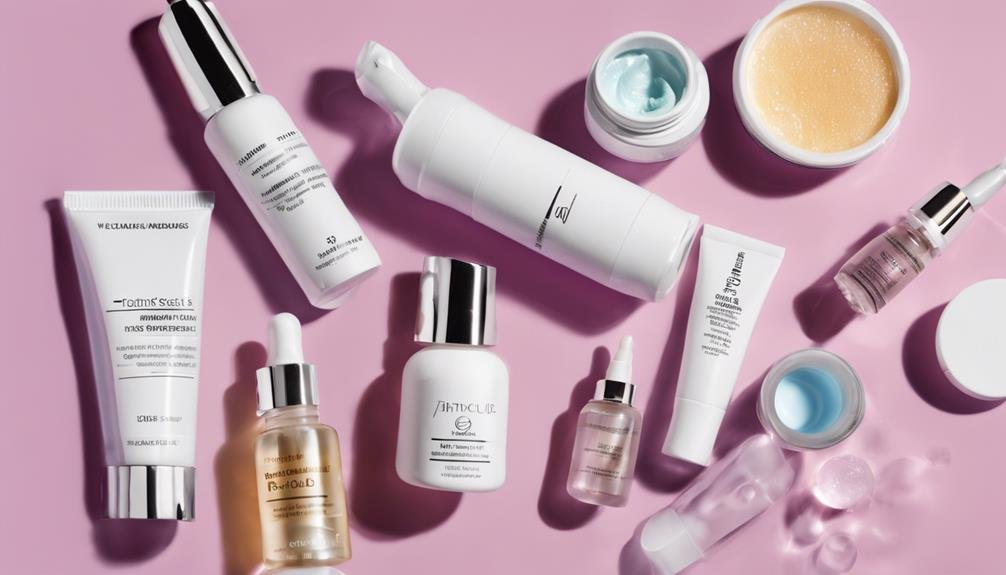If you've been wondering about the key to improving skin elasticity, you might want to consider the impact of your daily habits and skincare choices. While age plays a role in skin elasticity, there are practical steps you can take to enhance it. From simple lifestyle changes to targeted skincare routines, understanding these factors can make a noticeable difference in your skin's firmness and overall health.
Importance of Hydration
Ensuring adequate hydration is crucial for improving skin elasticity. Hydration tips play a vital role in maintaining the skin's elasticity benefits.
Drinking plenty of water throughout the day helps keep your skin hydrated from the inside out, contributing to a more supple and resilient appearance. Additionally, incorporating hydrating foods such as fruits and vegetables into your diet can further enhance your skin's elasticity.
To optimize skin elasticity benefits, consider using a moisturizer that contains hyaluronic acid, glycerin, or ceramides. These ingredients help attract and retain moisture in the skin, promoting a plump and firm complexion.
When applying moisturizer, remember to do so on damp skin to lock in hydration effectively.
Furthermore, avoiding excessive caffeine and alcohol consumption can aid in maintaining skin hydration levels. These substances can dehydrate the skin, leading to decreased elasticity over time.
Essential Skincare Routine
To maintain optimal skin elasticity, a consistent and effective skincare routine is essential. Your skin barrier plays a crucial role in preserving elasticity, while maintaining a proper moisture balance is key to overall skin health. Here are five essential steps to incorporate into your skincare routine:
- Gentle Cleansing: Use a mild, non-stripping cleanser to remove impurities without disrupting the skin barrier.
- Hydrating Moisturizer: Choose a moisturizer rich in hydrating ingredients like hyaluronic acid to maintain the skin's moisture balance.
- Sun Protection: Apply a broad-spectrum sunscreen daily to shield your skin from harmful UV rays that can damage the skin barrier.
- Serums: Incorporate serums with antioxidants like vitamin C to protect the skin barrier from free radical damage.
- Night Cream: Use a nourishing night cream to repair and replenish the skin barrier while you sleep.
Power of Antioxidants
Antioxidants are powerful compounds that play a crucial role in maintaining skin health and combating the effects of environmental stressors. Including antioxidant-rich foods in your diet can provide significant benefits for your skin elasticity.
Foods like berries, nuts, seeds, green tea, and dark leafy greens are packed with antioxidants that help protect your skin from damage caused by free radicals, UV radiation, and pollution.
These antioxidants work by neutralizing free radicals, which are unstable molecules that can damage collagen and elastin in the skin, leading to loss of elasticity and premature aging.
Incorporating Collagen-Boosting Foods
Boosting collagen production in your skin is essential for maintaining its elasticity and firmness. To achieve this, incorporating collagen-boosting foods into your diet is crucial. Here are some tips to help you enhance your skin's natural collagen production:
- Protein-rich diet: Include lean meats, fish, eggs, dairy, legumes, and nuts in your meals to provide your body with the necessary building blocks for collagen synthesis.
- Vitamin C sources: Citrus fruits, strawberries, kiwi, bell peppers, and broccoli are excellent sources of vitamin C, a key nutrient for collagen production.
- Leafy greens: Spinach, kale, and other leafy greens are rich in antioxidants and vitamins that support collagen synthesis.
- Bone broth: Consuming bone broth can provide collagen peptides that may help improve skin elasticity.
- Berries: Blueberries, raspberries, and blackberries are packed with antioxidants that can help protect existing collagen in your skin.
Benefits of Facial Massage
Facial massage is a rejuvenating practice that offers numerous benefits for your skin's health and appearance. Not only does it promote relaxation and stress relief, but it also aids in improving skin elasticity through various mechanisms. One key benefit of facial massage is lymphatic drainage, which helps to reduce puffiness and promote the removal of toxins and waste from the skin. This can result in a more radiant and youthful complexion.
Additionally, facial massage often involves the use of acupressure techniques, which target specific pressure points on the face to stimulate circulation and promote collagen production. By increasing blood flow to the skin, these techniques can help enhance skin elasticity and firmness over time.
Incorporating regular facial massages into your skincare routine can be a beneficial way to improve skin elasticity and overall skin health. So, next time you have a few spare minutes, consider treating yourself to a relaxing facial massage to reap these wonderful skin benefits.
Role of Sun Protection
When it comes to maintaining healthy and youthful skin, one crucial aspect that can't be overlooked is the role of sun protection. Exposure to the sun's harmful UV rays can accelerate skin aging and decrease elasticity over time. To ensure your skin remains supple and firm, consider the following tips:
- Sunscreen application: Apply a broad-spectrum sunscreen with an SPF of 30 or higher daily, even on cloudy days.
- UV protection: Seek shade during peak sun hours, typically between 10 a.m. and 4 p.m.
- Protective clothing: Wear wide-brimmed hats, sunglasses, and long sleeves to shield your skin from direct sunlight.
- Reapplication: Remember to reapply sunscreen every two hours, or immediately after swimming or sweating.
- Daily routine: Make sun protection a part of your daily skincare routine, just like cleansing and moisturizing.
Effective Topical Treatments
To effectively enhance skin elasticity beyond sun protection, exploring the realm of topical treatments can offer targeted solutions. Natural remedies like aloe vera, coconut oil, and shea butter are known for their moisturizing and skin-nourishing properties. These ingredients can help improve skin elasticity by providing essential nutrients and hydration.
Additionally, incorporating skin firming exercises into your routine can complement the effects of topical treatments. Massaging the skin with firm, upward strokes can stimulate blood flow and promote collagen production, leading to improved elasticity over time.
When choosing topical treatments, look for products containing ingredients like retinol, vitamin C, and peptides, which have been shown to enhance skin firmness and elasticity. Remember that consistency is key when using topical treatments for skin elasticity – apply them regularly and patiently wait for the desired results.
Frequently Asked Questions
Can Genetics Affect Skin Elasticity?
Genetic factors play a significant role in determining skin elasticity. While you can't control your genes, making healthy dietary choices rich in antioxidants and collagen-boosting nutrients can help support and maintain your skin's elasticity over time.
Is Excessive Sun Exposure the Main Cause of Loss of Skin Elasticity?
When it comes to the main cause of loss of skin elasticity, excessive sun exposure can indeed be a significant factor. Protecting your skin from UV rays through sunscreen and proper skincare routines is crucial.
How Does Smoking Affect Skin Elasticity?
Smoking negatively impacts skin elasticity by reducing collagen production and blood flow. It can lead to premature aging, wrinkles, and sagging skin. Additionally, smoking can dehydrate your skin, making it essential to maintain proper hydration levels and a balanced diet.
Can Stress Impact Skin Elasticity?
Stress can significantly impact skin elasticity. Factors like diet influence, sleep quality, and skincare routine play a key role. Prioritize self-care, maintain a healthy diet, improve sleep patterns, and practice stress-relieving activities to support skin health.
Are There Any Specific Exercises to Improve Skin Elasticity?
To improve skin elasticity, focus on dietary habits and hydration levels. Incorporate exercises like facial yoga, facial massages, and facial exercises to boost blood flow and collagen production, which can help enhance skin elasticity over time.
Conclusion
As you continue on your journey to improve skin elasticity, envision your skin as a lush garden in need of constant nourishment and care. By staying hydrated, following a consistent skincare routine, incorporating collagen-boosting foods, indulging in antioxidant-rich treatments, and embracing the power of facial massages, your skin will bloom with vitality and elasticity. Remember, the path to radiant and firm skin is within reach – just keep nurturing it with love and attention.





